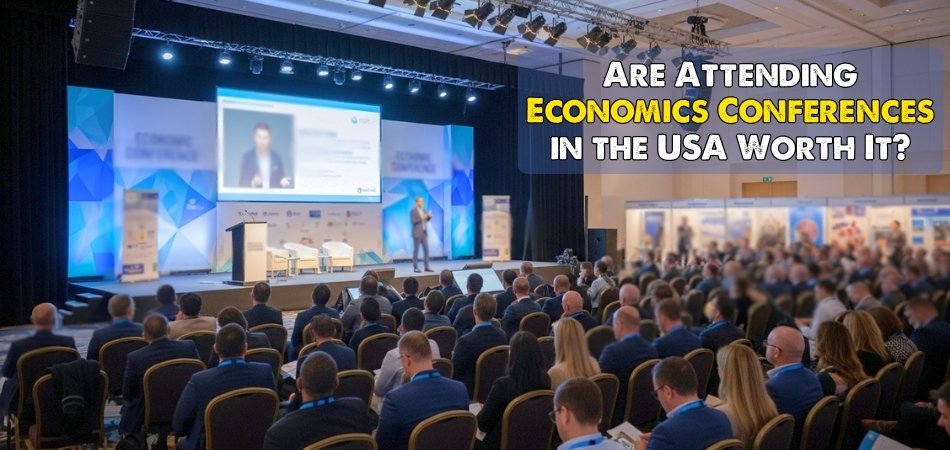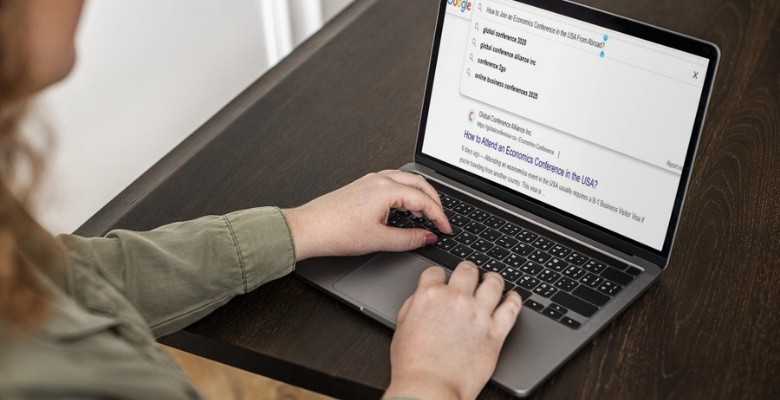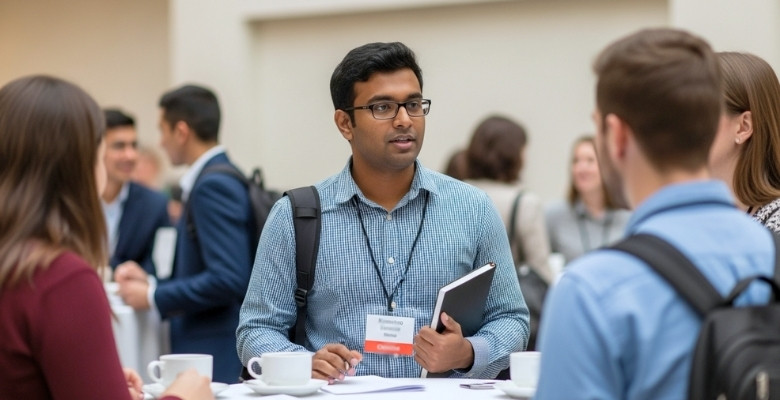Economics conferences take place all across the USA every year, bringing together people who love to talk and learn about money, markets, and how things work in the economy. These events are filled with expert talks, new ideas, and interesting discussions. If you’ve ever thought about joining one, you might be wondering, Are attending economics conferences in the USA worth it?
Attending economics conferences in the USA is worth it. They offer a chance to learn from top experts, find new trends, meet interesting people, and see how economics works in real life. These events also help you grow your knowledge and build strong connections. You can even share your thoughts and learn from others in a fun and friendly way.
Do you want to know more about why these conferences are a good choice? Or are you curious about what really happens there and what you can gain from it? Then keep reading, because this article covers everything you need to know about the topic.
Are Attending Economics Conferences in the USA Worth It?
Yes, attending economics conferences in the USA can be worth it. These events bring together people from different places who are interested in economics. You get to listen to experts, share your thoughts, and learn new things. There is a lot to find at these conferences, so keep reading to find out why attending can really be worth your time.

Meeting New People
Economics conferences are great places to meet people who share the same interests as you. You can talk to professionals and make new friends. These connections can help you understand economics in different ways. You might even find someone who can give you advice or answer your questions about the subject.
Learning From Experts
You get to hear experts speak about important topics at these conferences. They explain ideas in simple words, which makes them easier to understand. One of the benefits of attending an economics conference in the USA is that you can ask questions and clear your doubts directly from the speakers. This is a good way to learn new things about economics. You may even come across topics that you hadn’t heard about before.
Seeing Real-World Examples
Conferences often share stories and examples from real life. This helps you see how economics works outside of books and classrooms. You might learn about businesses, markets, and how money moves around. Understanding these examples makes economics feel more real and interesting.
Finding Latest Trends
Economics keeps changing with time, and conferences help you keep up with these changes. You can learn about the latest trends, new ideas, and important news in economics. This knowledge can help you stay updated. It can also make discussions about economics more fun and engaging.
Sharing Your Ideas
You get a chance to share your own ideas and thoughts at conferences. This can be during group talks, question sessions, or even casual conversations. It feels good when people listen to your views. Sometimes, your ideas might even spark more discussion and learning.
Getting Inspired

Having Fun
Conferences are not just about learning. There are fun activities, games, and sometimes trips or social events. You can enjoy yourself while also learning new things. These moments make the whole experience memorable and enjoyable.
How to Join an Economics Conference in the USA From Abroad?
Joining an economics conference in the USA from another country may sound like a big step. There are a few things to know and plan before you can attend. With the right steps, it can become much easier. Read below to find out exactly how you can do it.
Finding the Right Conference
Start by looking for a conference that matches your interests. There are many types of upcoming conferences in USA held in different cities across the country. Check websites or official pages for dates, topics, and details. Make sure the event is open to people from outside the USA. Once you find one, note down all the important information.
Registering for the Event
Most conferences need you to sign up before attending. Go to the official conference website and look for the registration section. You may have to fill out a form with your name, contact details, and sometimes a short reason for joining. After that, you might need to pay a small fee. Make sure to do this early, as spots can fill up quickly.
Applying for a Visa
If you live outside the USA, you’ll most likely need a visa to enter. First, check what type of visa is required for attending a conference—usually a visitor visa. Visit the official U.S. embassy website in your country and follow the steps to apply. You may need documents like your passport, invitation letter, and proof of your registration. Apply early, because visa processing can take time.
Booking Travel and Stay
Once your visa is approved and you’re registered, it’s time to book your trip. Look for flights to the city where the conference will be held. You also need a place to stay, so search for hotels or guesthouses near the event venue. Try to book both early so you can get better prices and choices. Keep all your travel details saved safely.
Preparing for the Conference
Before the event, read about the topics that will be discussed. It helps you understand more during the talks and sessions. You can also prepare questions if you want to ask anything. Make sure you have all your documents ready—passport, visa, registration papers, and travel details. Pack your bags with clothes and items you’ll need during your trip.
Staying Safe and Smart
Traveling to a new country can be exciting, but it also needs care. Keep your passport and important papers safe at all times. Follow local rules and stay in safe places. If you ever feel confused or lost, ask someone at the conference or nearby for help. Most people are kind and ready to help visitors.
Types of Sessions Attendees Can Experience at U.S. Economic Conferences
U.S. economic conferences offer a mix of learning, discussion, and real-world ideas. Attendees get to explore different topics in unique ways. Each session type gives a new way to see and understand how economics works today.
- Keynote Speeches: Famous experts share big ideas and talk about major issues in the world economy that matter to everyone today.
- Panel Discussions: Multiple speakers discuss one topic together, sharing different views and making the conversation deeper and more interesting for listeners.
- Workshops: These are hands-on sessions where attendees try activities, solve problems, and learn by doing, not just by listening.
- Networking Breaks: Time is set aside for people to meet, chat casually, and make new contacts in a friendly and open space.
- Research Presentations: Experts show their latest studies and data findings, helping others understand new facts and results in the field.
- Q&A Sessions: After some talks, the audience can ask questions, making the session more personal and easy to connect with.
- Poster Sessions: Large boards show economic ideas or research, and presenters explain their work while standing by to talk about it.
- Case Study Reviews: Real business or market problems are discussed step-by-step, showing how decisions were made and what lessons were learned.
When Is the Best Time to Attend Your First Economics Conference in the USA?
If you are planning to attend your first economics conference in the USA, timing is something you might want to think about. The right time can help you enjoy the event more and learn better. Different months and seasons offer different experiences. Keep reading to find out when the best time really is.
Spring Events
Many big conferences take place in spring, between March and May. The weather is pleasant, and travel is usually smooth. Speakers are often more active during this season, making the sessions more exciting. It’s also a popular time for fresh ideas and topics.
Summer Options
Summer events happen from June to August, often in large cities or universities. The weather is warmer, and people usually have more time to attend. Some conferences include outdoor activities or short trips. It can be a fun mix of learning and travel.
Fall Season Picks
September to November is another great time for conferences. The weather is cooler, and cities are less crowded. Many top conferences are held during the fall, attracting well-known experts. This season is perfect if you like a calm but focused experience.
Avoiding Busy Times
Try not to choose dates that fall during U.S. public holidays or big events. Flights and hotels can be very costly then. Crowds are larger, and things can feel rushed. A quiet week gives you more time to focus and enjoy.
Based on Your Comfort
Pick a time when you feel ready and free from other work. You’ll enjoy it more when your mind is clear. If you’re not sure where to begin, start by trying to find economics conferences in the USA that match your interests and schedule. If you like warmer weather, go in summer; if you prefer cooler days, try fall or spring. The best time depends on what suits you best.
What Are the Costs Involved in Attending an Economics Conference in the USA?
Going to an economics conference in the USA can be a great experience. But before you go, it’s important to understand the money you might need. There are many things you have to pay for, and some can be costly. Read below to learn more about the different costs and how you can plan smartly.
Conference Ticket
To join the conference, you will need to buy a ticket. Some tickets are cheap, but others can cost a lot. For small events, it may be around $50 to $150. Big conferences with famous speakers usually charge more, sometimes up to $500 or more. Sometimes, the ticket includes meals or printed materials, but not always. If you buy early, you may get a discount.
Travel Expenses
If you are coming from another city or country, you will need to spend on travel. Most people fly to the city where the event is held. Airfare from another country may cost $500 to $1,500, depending on where you’re flying from. Local flights or buses within the USA could be around $100 to $300. You may also have to spend on buses, trains, or taxis after landing, around $20 to $100. Try using public transport to save money.
Accommodation Cost
Finding a place to stay during the conference is important. Hotels close to the venue are convenient but often cost more. Prices usually range from $80 to $200 per night, depending on the location. For more affordable stays, hostels or shared rooms can cost between $40 and $80. Booking early through trusted websites can help you save. Always check reviews to ensure the place is safe and clean.
Meals and Snacks
You’ll need to eat while attending the conference. Some conferences provide lunch, but many don’t. Eating out for three meals a day can cost around $30 to $60 per day. Try finding places that serve good food at low prices or grab fast food meals for about $8 to $12 each. You can also carry snacks and water in your bag. This helps save money and keeps you full during the day.
Conference Materials
Some conferences offer printed materials like notebooks, books, or welcome kits. While these are sometimes free, other events may charge $10 to $50 for them. If there’s a fee, think about whether you actually need them—much of the content is often available online afterward. Bringing your own notebook and pen is a simple way to take notes and avoid extra costs.
Extra Activities
Many conferences offer things like city tours, group dinners, or extra workshops. These extras usually cost around $20 to $100, depending on the activity. You don’t have to join them if you don’t want to. Always check the cost before signing up. If it fits your budget, it can be a nice part of the trip. If not, you can skip and still enjoy the main event.
How to Make the Most of Your Time at an Economics Conference?
Attending an economics conference can be exciting and full of new ideas. You may meet many interesting people and learn things you never knew before. The experience can feel a bit busy or confusing at first. Keep reading to learn how you can get the best out of every moment.
Plan Your Schedule
Before the conference starts, look at the event schedule. Pick the talks or sessions you want to attend the most. Write them down or save them on your phone. Make sure you give yourself time for breaks as well. Having a plan keeps you from missing anything important.
Meet New People
Conferences are great places to meet others who like the same things as you. Don’t be shy to start a friendly conversation. You can ask about their thoughts on the event or what sessions they like. Making new friends can help you learn more. It also makes the event more fun.
Ask Questions
If you don’t understand something, it’s okay to ask questions. Speakers and experts are usually happy to help. Write your questions down so you remember them during the session. Asking questions helps you understand topics better. You might also help others who have the same question.
Take Good Notes
Bring a notebook or use your phone to take notes during talks. Write down key points and interesting facts you hear. Notes help you remember what you learned later. Try to keep your notes neat so you can read them easily after the conference. Good notes are very useful for future reference.
Join Group Activities
Many conferences have group sessions or fun activities. These are great for learning in a relaxed way. You can work with others, play games, or solve problems together. Group activities are a nice way to make friends. They also help you see economics in action.
Visit the Stalls
Look for stalls or booths set up by organizations or companies. You might find free booklets, gifts, or new ideas there. Some stalls give information about scholarships or future events. Take your time to explore and collect anything useful. Visiting stalls can be both fun and helpful.
Relax and Enjoy
Don’t forget to take breaks and have fun. Conferences can be busy, but it’s important to rest. Enjoy the food, chat with people, or just relax for a while. This helps you feel refreshed and ready for the next session. A happy mind learns better.
Frequently Asked Questions
If you’re still curious about economics conferences in the USA, you’re not alone. Many people have questions about what to expect, what they’ll learn, and how to make the experience better. Here are some commonly asked questions along with helpful answers that can guide you.
What Do People Usually Wear to Economics Conferences?
Most people wear neat, clean, and simple clothes like shirts, trousers, or nice dresses. You don’t need to wear a full suit unless the event says so. Comfortable shoes are also a good idea because you may be walking a lot. Always check the event’s website for dress code tips.
How Long Do Economics Conferences Usually Last?
Economics conferences usually last between one to three days. Some may be just a few hours, while others are full-day events. Big conferences can even go for a week. Always check the schedule to know what to expect and how to plan your time.
Can Beginners Understand the Topics at Conferences?
Yes, many sessions are made easy for beginners. Speakers often explain things in simple words, especially in basic-level sessions. If something sounds too hard, you can skip it and attend sessions made for general understanding. Most conferences welcome all levels of interest.
How Can I Remember Everything I Learn?
Taking good notes is the best way to remember what you learn. You can also take photos of slides or ask for handouts. Talking about what you learned with others helps you remember too. Review your notes after the event to keep things fresh.
Are Meals Always Included in the Ticket?
Not always. Some conferences include lunch or light snacks, but others may not offer any food. Check the ticket details or contact the organizers to be sure. Carrying a snack and water is a good backup plan.
Do I Need to Know All the Topics Before Attending?
No, you don’t need to know everything before you go. Conferences are meant to teach and inspire you. Just having an interest in economics is enough. You’ll learn many things while attending the event.
What Happens If I Miss a Session?
If you miss a session, don’t worry. You can attend another one or ask someone what happened. Some conferences also share recordings or notes later. Missing one session doesn’t ruin the whole event.
Conclusion
Economics conferences in the USA are more than just talks and slides—they’re places full of ideas, stories, and real people who care about how the world works. Whether you’re there to learn, ask questions, or simply be curious, every moment counts.
From hearing top experts to sharing your own thoughts, these events give you something you can’t always get from books or videos. You meet people from many places, learn from real-world cases, and even enjoy fun activities along the way. It’s learning and living, all in one.
So, are attending economics conferences in the USA worth it? Yes, they truly are—if you’re ready to explore, connect, and grow in a way that feels exciting and real. You don’t just attend—you experience something you’ll remember.







